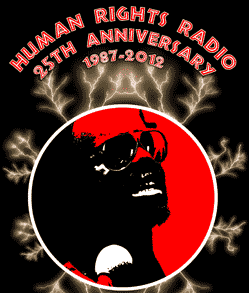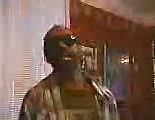When the FCC raided TOUCH FM in Boston this spring, many lamented its demise. But its frequency didn’t stay silent for long: less than two months after the FCC’s sweep of the city, a pop-up station temporarily reoccupied 106.1 FM.
Noises Over Norwell broadcast from a two-story home in Dorchester currently under the receivership of Fannie Mae. Its former owners moved back in with the assistance of City Life/Vida Urbana, a grassroots organization dedicated to fighting economic injustice in Boston. The station was a cornucopia of information, discussion, and creativity about the state of the economy and the surrounding neighborhood; when "dormant," you simply heard the ambient sounds of a lived-in home. Continue reading “Pop-Up Station Pays Homage to TOUCH FM”
Tag: mbanna kantako
Human Rights Radio Turns 25
 On November 26, 1987, Mbanna Kantako founded WTRA, an unlicensed microradio station broadcasting from the John Jay Homes in Springfield, Illinois.
On November 26, 1987, Mbanna Kantako founded WTRA, an unlicensed microradio station broadcasting from the John Jay Homes in Springfield, Illinois.
Legally blind and in his twenties at the time, Kantako started the station to protest the imminent destruction of the housing project by the city and the pervasive police abuse that occurred there.
WTRA would later be re-named Human Rights Radio to reflect the Kantako family’s widening concern with issues of social injustice.
FCC Enforcement: Old and New
A much-overdue update to the Enforcement Action Database is done. So far in 2011, the FCC has conducted less than 100 enforcement actions – way down from this time last year, when 359 were already on the books.
The major changes to this year’s enforcement trends include an apparent stiffening of fiscal penalties and a diversification of enforcement across all broadcast bands. On the first point, the FCC seems to be increasing fines from the base-penalty of $10,000. Not that this actually works as a deterrent: in cases where an unlicensed broadcaster demonstrates an inability to pay, fines must be radically reduced. Continue reading “FCC Enforcement: Old and New”
The History of LPFM
What is LPFM?
LPFM stands for Low Power FM radio broadcasting. In the United States, the lowest minimum wattage a licensed FM radio station may have is 100 watts. There are lower-power FM transmitters in use, though, by some stations who want to increase their coverage area by extending their signal. These are called translators or boosters.
While these may only have a wattage measured in a range from dozens to hundreds, they are not true broadcast stations by the FCC’s definitions – they do not originate their own programming. They rely on a “parent” station to provide what they air.
Ham (amateur) radio uses a similar system called a repeater; people don’t broadcast from it. They shoot a signal into it, and then it gets re-broadcast to an area larger than what ham operators might reach with their own gear. In a nutshell, translators and boosters are the repeaters of FM radio.
LPFM is the common term used to define an FM broadcast station that originates its own programming but has the power of a translator or booster. Under current FCC rules, operating such a station is simply not allowed. You may also see LPFM referred to by other terms – like “LPRS,” “microradio,” and “mini-FM,” but they all mean the same thing. Continue reading “The History of LPFM”
Scene Reports: Illinois, Louisiana
Illinois: It seems that a group of folks headed out after the WRFU barnraising to pay a visit to Springfield, the home of Mbanna Kantako‘s Human Rights Radio. They found Kantako and the station in good spirits, albeit at extremely low power, thanks to a blown amplifier, which is now under repair.
Kantako celebrates his 18th nearly-uninterrupted year on the air in five days – a large portion of which has been archived on tape. Continue reading “Scene Reports: Illinois, Louisiana”
Scene Reports: California, Illinois
California: Skidmark Bob just interviewed Monkey of the infamous Pirate Cat Radio. Monkey scored an early copy of Stephen Dunifer’s TV transmitter kit and put Pirate Cat TV on the air six months ago; its 80-watt signal can be seen on Channel 13 in the San Francisco area. Programming consists of a growing catalog of DIVX .avi files on a homebrew server with a terabyte of storage, and the station is actively soliciting more content.
As for Pirate Cat Radio, Monkey says there’s about 30 DJs presently, and the dues-paying fundraising model takes care of their needs. At the end of the interview he says the station will soon “upgrade” from 220 to 1,000 (!) watts, mostly by moving to a directional antenna system. Continue reading “Scene Reports: California, Illinois”
Mbanna Material Resurrected, Good Riddance Randy Michaels?, IBOC Surprise
A busy week. The Human Rights Information Network is back in action – all of Mbanna’s previous material is back online, and there’s 13 new episodes of the Human Rights Patrol, a new album of music from Ebony Kantako, and the start of a new archive of raw audio from the Human Rights Radio tape library. Mbanna now has more than a gigabyte of audio online, with plenty more sure to come.
There’s also new entries to the Enforcement Action Database – primarily a slew of NALs to operators in Florida, and one to the owner of a licensed station in Kansas who operated a pirate station on the same frequency out of a local nightclub. How smart is that?
We’ll be putting up the rest of our audio library and more features over the course of the next week. Soon, we’ll be back in business for real. Continue reading “Mbanna Material Resurrected, Good Riddance Randy Michaels?, IBOC Surprise”
Trading Shots With the FCC
(Click on images to play video clips)
Enforcement efforts against unlicensed broadcasters have stepped up nationwide. Just two days after recent protests at the National Association of Broadcasters radio convention in San Francisco concluded, Humboldt (CA) Pirate Radio received three visits from FCC agents.
Then, Radio One Austin (TX) was raided by law enforcement and had its station equipment destroyed; and a station in Michigan was sent a letter to stop broadcasting or face the consequences.
 But the most dastardly blow was the silencing of Human Rights Radio in Springfield, Illinois. Continue reading “Trading Shots With the FCC”
But the most dastardly blow was the silencing of Human Rights Radio in Springfield, Illinois. Continue reading “Trading Shots With the FCC”